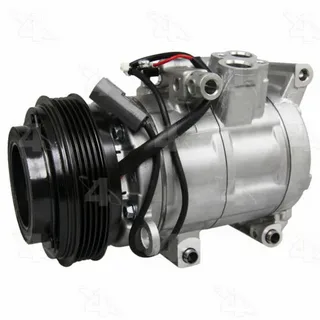As the summer sun blazes down, there’s nothing more refreshing than a cool breeze wafting from your car’s air conditioning. But what happens when that comforting chill turns into warm disappointment? If you own a Mitsubishi Lancer, you might face frustrating AC compressor issues when you need them most. Whether it’s strange noises, reduced airflow, or an outright failure to cool, understanding these common problems is key to keeping your ride comfortable and reliable. In this blog post, we’ll dive deep into the Mitsubishi Lancer AC compressor world.
The Importance of the Lancer AC Compressor
The AC compressor is crucial to your car’s air conditioning system. It is vital to keep you cool and comfortable driving, especially during hot summer days. Without it, the air conditioning system would not be able to function correctly, making your daily commute or road trip quite uncomfortable.
One of the main functions of the Lancer AC Compressor is to compress and circulate the refrigerant gas throughout the air conditioning system. This process is necessary to cool down the air entering your car’s cabin. The compressor draws in low-pressure refrigerant gas from the evaporator and then compresses it into high-pressure gas before sending it to the condenser for cooling. This cycle continues as long as your car’s AC system is running.
Aside from cooling the air inside your vehicle, the AC compressor also removes moisture from the system. If left unchecked, moisture can damage various components of your car’s AC system. The compressor reduces humidity levels by continuously cycling and compressing refrigerant gas, preventing moisture build-up.
Another crucial reason for maintaining a working AC compressor is its impact on fuel efficiency. A faulty or malfunctioning compressor requires more power to operate, resulting in higher fuel consumption.
Signs of a Failing Mitsubishi Lancer Air Conditioner Compressor
The air conditioner compressor is crucial to the Mitsubishi Lancer’s cooling system. It compresses and circulates refrigerant throughout the AC system, which ultimately cools the air blown into the cabin. However, like any other mechanical part, the AC compressor can experience issues and fail over time. This section will discuss some common signs that indicate a failing Mitsubishi Lancer Air Conditioner Compressor.
Unusual Noises:
One of the first signs of a failing AC compressor is abnormal noises under the hood. These noises range from rattling or knocking to screeching or grinding noises. This could be due to worn-out bearings or internal damage within the compressor.
Poor Cooling Performance:
If you notice that your Lancer’s air conditioner is not blowing cold air as it used to, it could be a sign of a failing compressor. The compressor plays a vital role in cooling down the refrigerant, and if it is not functioning correctly, it will affect the overall performance of your car’s AC.
Leaking Refrigerant:
A leak in the refrigerant lines can cause low refrigerant levels in your AC system, making it difficult for your car’s interior to cool down properly. While there could be other reasons for leaking refrigerant, a faulty compressor is one of them.
Compressor Clutch Not Engaging:
The compressor clutch allows power from the engine to drive and operate the AC compressor when needed. If you try turning on your car’s AC and notice that nothing happens or that the temperature inside your vehicle does not change, then this could be an indication that there is an issue with the clutch or, even worse, the entire compressor unit.
Steps to Troubleshoot 2008 Mitsubishi Lancer Ac Compressor Issues
If you own a 2008 Mitsubishi Lancer and are experiencing issues with your AC compressor, don’t panic. AC compressor problems are common in vehicles and can often be quickly resolved with some troubleshooting techniques. This section will discuss the steps you can take to troubleshoot 2008 Mitsubishi Lancer AC compressor issues.
Check for Power Supply
The first step when troubleshooting any car issue is to check for a power supply. In the case of an AC compressor malfunction, start by checking if power is running through the system. You can use a multimeter to test the voltage at the compressor’s electrical connections. If there is no power supply, it could indicate a blown fuse or a faulty relay switch that needs to be replaced.
Inspect the Compressor Belt
Next, visually inspect the belt connecting the engine to the AC compressor. A worn or damaged belt can cause problems with your AC system, such as reduced cooling performance or strange noises coming from under the hood. If you notice any cracks or fraying, the belt may need to be replaced.
Check Refrigerant Levels
Low refrigerant levels are a common cause of AC compressor issues in cars. To check for low refrigerant levels, locate the service port on top of your vehicle’s air conditioning lines and attach a pressure gauge. If the reading is lower than your car’s manufacturer recommended, it might indicate a refrigerant leak that must be fixed before refilling.
Clean/Replace Air Filters
A clogged air filter can also contribute to poor cooling performance in your car’s AC system. Check your air filters regularly and clean or replace them as needed.
Testing the Air Conditioner Compressor Mitsubishi Lancer
The air conditioner compressor is essential to your Mitsubishi Lancer’s AC system. It compresses and circulates the refrigerant, cooling the air before it enters your car’s cabin. If the compressor is not functioning correctly, it can lead to a lack of cool air or even a complete failure of your AC system.
You will need to perform some tests to determine if there are issues with your Air Conditioner Compressor Mitsubishi Lancer. These tests involve checking the electrical connections, inspecting the physical condition of the compressor, and evaluating its performance.
Checking Electrical Connections:
Start by checking all the electrical connections related to the AC compressor. Make sure that they are clean and securely connected. Loose or damaged connections can prevent proper power supply to the compressor, resulting in malfunctioning.
Inspecting Physical Condition:
Next, visually inspect the physical condition of the compressor and its surrounding components. Look for any signs of damage, such as cracks or leaks in hoses, belts, or seals. Also, check for any unusual noises from the compressor when running.
Evaluating Performance:
The final step is evaluating how well your Mitsubishi Lancer’s AC system is performing overall. Turn on your car’s engine and let it run for a few minutes before turning on the AC at maximum cooling settings. Then, observe if cool air is blowing out of all vents at a steady rate and temperature.
How to Fix AC Compressor Issues in Mitsubishi Lancer?
If you own a Mitsubishi Lancer and are experiencing issues with your AC compressor, you may be wondering how to fix it. The AC compressor is an essential component of your car’s air conditioning system, responsible for compressing the refrigerant gas that cools the air before it enters your car’s cabin. When this component malfunctions, it can lead to a lack of cool air or even a complete failure of the AC system.
Here are some steps you can take to troubleshoot and fix AC compressor issues in your Mitsubishi Lancer:
Check for Leaks:
One of the most common causes of AC compressor problems is leaks in the system. These leaks can occur at various points, such as the hoses, valves, or seals. To check for leaks, park your car on a level surface and turn on the engine. Let it run for a few minutes before turning off the engine and inspecting under the hood for any signs of leakage.
Inspect Electrical Connections:
Faulty electrical connections are another possible cause of AC compressor issues. Ensure all connections to the compressor are secure and free from corrosion or damage. If necessary, clean any corroded terminals and tighten loose connections.
Check Compressor Clutch:
The clutch in your AC compressor is responsible for engaging and disengaging when needed to compress refrigerant gas. An issue with the clutch can result in a lack of cool air or strange noises coming from under the hood when you turn on your AC. You can visually inspect the clutch by looking through slots on top of the compressor while someone else turns on/off your AC.
Maintaining the 2002 Mitsubishi Lancer Ac Compressor
Maintaining the AC Compressor is crucial in ensuring the proper functioning of your car’s air conditioning system. Regular maintenance and upkeep can prolong the life of your compressor and prevent costly repairs or replacements down the line.
One important aspect of maintaining your 2002 Mitsubishi Lancer AC compressor is regularly checking and replacing the refrigerant. The refrigerant is responsible for cooling the air that enters your car’s cabin, and over time, it can deplete or become contaminated. It is recommended that a professional mechanic check and refill the refrigerant every 2-3 years.
Another crucial step in maintaining your AC compressor is regularly cleaning or replacing the air filter. A clogged air filter can put unnecessary strain on your compressor, causing it to work harder and potentially leading to malfunctions. It is recommended that you clean or replace the air filter every 10,000-15,000 miles.
In addition, it is essential to monitor the belts and hoses connected to your AC compressor. These components transfer power from the engine to operate the compressor, and any wear or damage can affect its performance. Ensure these parts are inspected during routine maintenance checks and replaced if necessary.
Conclusion
In conclusion, troubleshooting Mitsubishi Lancer Ac Compressor issues may seem daunting initially, but it can be quickly resolved with the proper knowledge and steps. From checking the simple things like fuses and refrigerant levels to possible repairs or replacements of parts, following these tips can help get your AC system up and running again. Remember to regularly maintain and service your car’s AC system to prevent future problems. With proper care and maintenance, you can enjoy an incredible ride in your Mitsubishi Lancer all year round.
FAQS
What is a Mitsubishi Lancer Ac Compressor, and how does it work?
The Mitsubishi Lancer Ac Compressor is a vital component of your Mitsubishi Lancer’s air conditioning system. It compresses and circulates refrigerant gas through the system, which cools the air inside your car. The compressor uses a belt that connects to the engine, which rotates and drives a piston inside the compressor to compress the refrigerant gas.
Why is my AC compressor not working?
Your AC compressor may not be working for several reasons, including a faulty clutch, low refrigerant levels, or electrical issues. Additionally, wear and tear over time can cause problems with the compressor’s functionality.
How do I know if my AC compressor needs to be replaced?
Some common signs that indicate your AC compressor may need to be replaced include strange noises from under the hood, warm air blowing out of the vents instead of cold air, and visible leaks or damage on the compressor itself.
Can I fix an AC compressor issue myself?
Attempting to fix an AC compressor issue yourself can be dangerous. It involves handling refrigerant gas, which can cause harm if mishandled. It’s best to leave any repairs or replacements to trained professionals with experience working with these systems.
| Related Business Listings |
| Contact Directory |
| Local Business Profiles |




